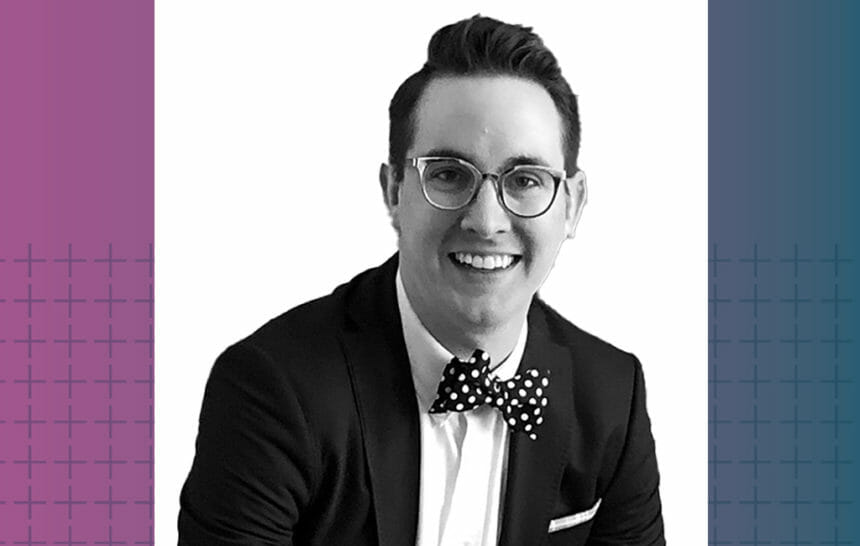How was your pandemic experience?
Good overall, even though a long-term relationship ended and my dog died. I thought of it as clean slate, that nothing was tying me down anymore. Plus I have a bang-up therapist, which goes a long way.
What was your most important pandemic takeaway?
The value of humanity, particularly in advertising and marketing. Too often people focus on achievements – what’s your margin, what’s your profit. Those are important, but being human-centered has been infused into the best leaders. The companies that succeed will be the ones that listen to their people.
My favorite thing was getting to see into people’s homes and getting to see their cats and dogs and everything else. You can draw a blueprint of some of your colleague’s houses without ever having been there, which is crazy.
How did you find your way into this business?
I was a musical theater major and I’ve been acting since I was 12. People ask how good I am — well, I’m from Indiana, so I say, “I’m Indiana-good.” Eventually I did a quick evaluation: If I’m successful as actor, the dream is to be on Broadway. That’s eight shows a week in perpetuity — and that’s peak success! Non-success is a dinner theater in Michigan doing Guys and Dolls.
So I double-majored in advertising and PR and found that I was good at making really complex information digestible. My dad was an industrial engineer and I had that language with him. I worked on Microsoft, but not the sexy part of Microsoft. For one of the big conferences, my job was making Microsoft compliance sound interesting and fun.
How long did you continue to pursue theater?
I did stage work in Indiana while working, because when you’re more junior in your career you’re allowed to do these things. I mean, I did A Christmas Carol during long lunch breaks. It wasn’t until I moved to New York eight years ago that I pulled back.
Growing up as theater kid, the collaboration was always so magical. That’s why I don’t feel like I gave up theater at all; I’m just doing a different form of art and collaboration and performance. A pitch is really a production. Doing a campaign is directing a play. Client calls are all improv — if they don’t like your jokes, you change course and get serious again.
I’m wildly ambitious. I used to think, “Why don’t I have this? Why can’t I have that?” But in advertising, not everybody wants to rule the world. Not everybody wants to be CEO. That never occurred to me growing up — because if you’re a theater kid, you want to be the star. You don’t do all the training and lessons so you can say nothing and stand in a corner.
When did you know you were in the right place?
I have a dirty mouth, which I’m trying to clean up for the purposes of this interview. At my first job, I was unpacking my things and listening to a woman next to me. She was on a call with a vendor ripping him in a way I’ve never heard anyone being ripped. I turned to the person next to me and said, “I think I’ve found my tribe.”
Seriously though: In this world, people tell you exactly how they feel and then move on. That’s really healthy. It’s such a good and direct industry.
As an aside, people think doctors are the smartest people in the world. But if we’re influencing doctors, aren’t WE the smartest people in the world? My doctor friends are not amused when I say this.
What are some of your frustrations with the business?
In this talent war, you’re seeing companies throw a lot of money at people and over-title them. The industry now has, like, 1,400 EVPs. Are they all going to be presidents next year? It’s irresponsible. Some people find it easier to over-promote than to mentor and guide and give candid feedback.
What’s something about you your colleagues don’t know?
I was brought in to audition for Mean Girls — for Damian, which is just a hilarious role. I don’t think I was close; it wasn’t down to me or him. When I didn’t get it, my mom said, “It’s fine, it’s just a movie, nobody’s ever going to see it.”
Also, I’m colorblind, which has been fun to deal with in advertising.
How would you like to be remembered by your peers?
Well, I’d like to leave this industry a little better than I found it. At this point, I’ve done every tactic. So what gets me out of bed is the people — the patient communities we’re impacting and the people I work with every day.
From the October 01, 2022 Issue of MM+M - Medical Marketing and Media







